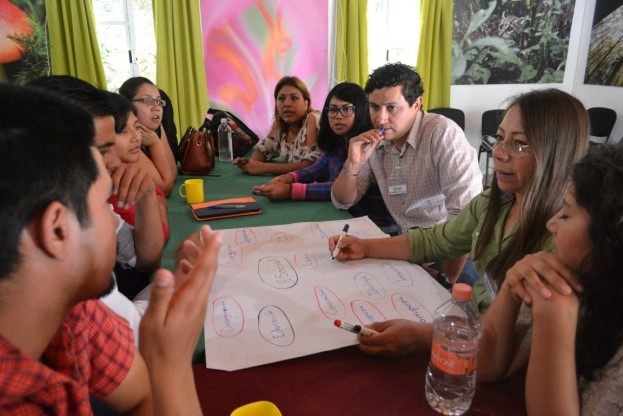

This building block consists of transferring knowledge of regenerative soil management to technicians, producers and state officials.
We offer a diploma course in Holistic Management at the Earth Center—our educational facility that offers an average of 40 workshops annually and capitalizes on GESGIAP’s 30 years of experience in conservation and sustainable development. The diploma course in Holistic Management is attended by officials, technicians, producers, and students and covers topics such as Key-line hydrological designs, pest control, bio-intensive crops, and preparation of bio-fertilizers. It is having a real impact on the formulation of public policies in the state of Querétaro, the application of resources, the management of livestock herds, and therefore, in the regeneration of soils.
Workshops, networking events where participants share their experiences, and on-going technical training and support to producers who adopt regenerative management tools, are also fundamental to this building block.
We ensure that necessary conditions are met by building alliances between producers, technicians, and officials; guiding and orienting public policies; providing technical training and support to producers; managing resources for optimal infrastructure development; and fostering a sense of responsibility and environmental stewardship in participants. In this way, we create a culture of conservation and participatory, ecological citizenship that is receptive to implementing regenerative soil management.
We have learned that in order to achieve a permanent impact, we must accompany projects until we are sure that participants have developed all necessary capacities. We must also provide support to participants to develop infrastructure and acquire equipment; continuously organize workshops for alliance-building among participants; optimize resource management; ensure a balance between conserving resources and generating economic opportunities; and establish monitoring and evaluation schemes that systematize experiences and record the impact of actions and strategies.
Biodiversity conservation, often seen as an economic burden for rural communities, is not guaranteed by the sole act of decreeing a territory as a protected area. Yet because of GESGIAP’s work for over 30 years—educating, training, providing technical accompaniment—we are seeing the emergence of a society with sustainability capabilities and a sense of belonging, defending the territory and working to restore biodiversity.